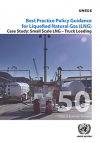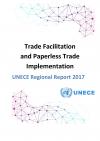Publications
Displaying Results 761 - 780 of 2825
- English
This report presents the findings from the assessment of the water-food-energy-ecosystems nexus, linked with a study of benefits of transboundary cooperation, in the Drina River Basin, mainly shared by Bosnia and Herzegovina, Montenegro and Serbia which was carried out from 2016 to 2017 in the framework of the UNECE Water Convention’s Programme of Work. The assessment aimed to foster
- English
As the second most polluting industry, the textile sector is responsible for a large portion of the world’s CO2 emissions and industrial waste, not to mention the exploitation of “indecent” working conditions. At the same time, the industry has a complex value chain, with production facilities located all over the world, which makes it very hard to gain accurate information about sources and
- English
Within the United Nations Economic Commission for Europe (UNECE), the United Nations Centre for Trade Facilitation and Electronic Business (UN/CEFACT) has developed a series of some 30 recommendations and standards that are used worldwide to simplify, standardize and harmonize trade procedures and information flows. Many of these are now international standards of the International Organization
- English
The Economic Commission for Europe (UNECE) has a long history of offering trade facilitation guidance, especially on the topic of Single Window. Since its emergence in 2004, Recommendation 33 on implementing a Single Window has been widely received as the reference on the subject and is used as the basis for many other organizations’ work as well as the cornerstone of many national
- English
Recommendation 42 on Trade and Transport Facilitation Monitoring Mechanisms (TTFMM) addresses issues related to institutional arrangements and methodology in designing and implementing TTFMM. It is an important contribution to UNECE’s suite of Trade Facilitation recommendations and guidance material.Download the Publication ECE/TRADE/
- English
Since the introduction in 1973 as the UNECE Recommendation No. 1, the UN Layout Key (UNLK) has provided Governments, organizations and the business community with a basis for a standard and aligned design of documents used in trade and transport. This has led to a major improvement in the standardization of trade documents in many countries throughout the world.Most international organizations
- English
Conventional economic statistics, such as national accounts and employment measures, are largely designed to measure the market economy and in most countries exclude unpaid household service work. Economists have argued for many years that ignoring these services introduces biases in various areas of economic analysis. For instance, an increase in childcare or long-term care provided by the
- English
This publication provides comparable data on causes, types and results of accidents in Europe, Canada and the United States. Data are organized by nature of accident and surroundings; accidents while under the influence of alcohol; and the number of persons killed or injured, by category or road user and age group. As background data, figures on the number of road vehicles in use and vehicle-
- English
- English
In the UNECE region, countries’ approaches to poverty measurement vary significantly. There is a large spectrum of poverty indicators, wide varieties of definitions, methods, thresholds and data sources that are not fully matched by national or international guidelines.This publication provides guidance on applying various measurement approaches and aims to improve the international
- English
Coordinated Operations of Flexible Coal and Renewable Energy Power Plants: Challenges and Opportunities ENERGY SERIES No. 52 This report argues that coordinated operations of renewable energy and fossil fuel- red power plants could help increase reliability and eciency of the whole system. At the same time, given the inherent
- English
Guidelines for Application of the United Nations Framework Classification for Resources (UNFC) to Uranium and Thorium Resources (ECE ENERGY SERIES No. 55) (December 2017)This publication provides non-mandatory guidance for the application of the United Nations Framework Classification for Resources (UNFC) to uranium and thorium resources.
- English
Removing Barriers to the Use of Natural Gas as Maritime Transportation FuelENERGY SERIES No. 54This report on Removing Barriers to the Use of Natural Gas as Maritime Transportation Fuel is another step in ourexploration of the catalytic role of natural gas in attaining the Sustainable Development Goals, and in
- English
The Explanatory Brochure on the Standard for Sweet Peppers has been developed to harmonize the interpretation of the Standard, thereby facilitating international as well as national trade. It addresses producers and traders, as well as inspection authorities. It corresponds to the latest edition of the UNECE Standard for Sweet Peppers (FFV-28), which was officially adopted in November 2009. In
- English
Best Practice Policy Guidance for Liquefied Natural Gas (LNG)Case Study: Small Scale LNG – Truck LoadingENERGY SERIES No. 50The transportation of Liquefied Natural Gas (LNG) via truck loading is a fast growing vector of natural gas delivery and the main alternative to supply via pipelines. According to the
- English
Facilitating trade is about streamlining and simplifying international trade, particularly import and export procedures, transit requirements and procedures applied by Customs and other agencies (UNECE-UN/CEFACT). With the rapid increase of international trade, thanks in part to the reduction of tariffs and quotas, it has become evident that for countries to benefit from open global markets it
- English
Application of UNFC to Geothermal Energy Resources - Selected Case Studies (ECE ENERGY SERIES No. 51) (December 2017) ECE/ENERGY/110
*** Also available in French, Spanish and
- English
The publication contains the authentic text of the Convention on Environmental Impact Assessment in a Transboundary Context (Espoo Convention) as amended on 27 February 2001 and on 4 June 2004 in English, French and Russian. The second amendment to the Espoo Convention (adopted in 2004
- English
This Smart Sustainable City Profile of Goris analyses the current situation of the city using the key performance indicators (KPIs) elaborated by the UNECE with the ITU and other partners, to support the municipality in setting up their priorities for action.
Goris was selected as the pilot city because of its strategic position in the system of roads in Armenia, its rich cultural and historical
- English
The 2nd edition of the Road Map, published in February 2022, can be found here.
The publication provides guidance to national statistical offices on producing statistics for SDGs. It lays out what needs to be done, who are the stakeholders, and what are the opportunities for cooperation. The Road Map deals with



















